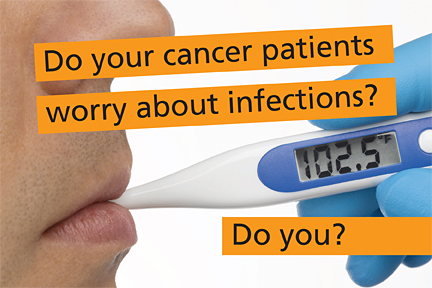You are here
Preventing Infections in Cancer Patients
Dr. Guh is a CDC medical officer and co-lead of Preventing Infections in Cancer Patients initiative.
Through a CDC Foundation collaboration with Amgen, CDC is leading a comprehensive program focused on providing information, action steps and tools for patients, their families, and their healthcare providers to reduce the risk of developing potentially life-threatening infections during chemotherapy treatment.
 As clinicians, we know that the nearly one million patients who receive outpatient cancer treatment each year are at risk for serious infections that may lead to hospitalization, disruptions in chemotherapy schedules, and in some cases, death. Even so, it appears that outpatient oncology facilities may vary greatly in their attention to infection prevention. As one example – at an oncology clinic in Nebraska, it was discovered that syringes were reused to access bags of saline that were shared among multiple patients. This unsafe practice led to the transmission of hepatitis C virus to at least 99 cancer patients, resulting in one of the largest healthcare-associated outbreaks of its kind.
As clinicians, we know that the nearly one million patients who receive outpatient cancer treatment each year are at risk for serious infections that may lead to hospitalization, disruptions in chemotherapy schedules, and in some cases, death. Even so, it appears that outpatient oncology facilities may vary greatly in their attention to infection prevention. As one example – at an oncology clinic in Nebraska, it was discovered that syringes were reused to access bags of saline that were shared among multiple patients. This unsafe practice led to the transmission of hepatitis C virus to at least 99 cancer patients, resulting in one of the largest healthcare-associated outbreaks of its kind.
To help address this problem, CDC launched a new program called Preventing Infections in Cancer Patients, featuring tools to help both clinicians and patients prevent infections.
As a cornerstone of this new initiative, CDC worked with partners to develop a Basic Infection Control and Prevention Plan for Outpatient Oncology Settings, which can be used by outpatient oncology facilities to standardize – and improve – infection prevention practices.
Based on CDC’s evidence-based guidelines as well as relevant guidelines from professional societies, the plan can be used as written or tailored for quick implementation in outpatient oncology facilities. Oncology facilities that already have an infection control plan in place should use this plan to ensure that their policies and procedures include the essential elements.
CDC’s Preventing Infections in Cancer Patients program also focuses on providing information, action steps, and tools for patients, their families, and their healthcare providers to reduce the risk of life-threatening infections during chemotherapy treatment. These resources include an interactive website that helps cancer patients understand their personal risk for developing a condition called neutropenia, a low white blood cell count during chemotherapy. Neutropenia is a common and potentially dangerous side effect of chemotherapy that reduces a patient’s ability to fight infection. Cancer patients and caregivers can answer a few questions about their risk factors and receive information about how to help lower their risk for infection and keep themselves healthy while receiving chemotherapy. The Basic Infection Control and Prevention Plan for Outpatient Oncology Settings are available on the Web site: www.preventcancerinfections.org.
I encourage you to share these new resources with your colleagues so that these vulnerable patients can be given the best chance to benefit from chemotherapy treatment and thrive.
This program was made possible through a CDC Foundation partnership with, and funding from, Amgen. As part of the partnership, the CDC Foundation considered oncology expertise provided by Amgen.